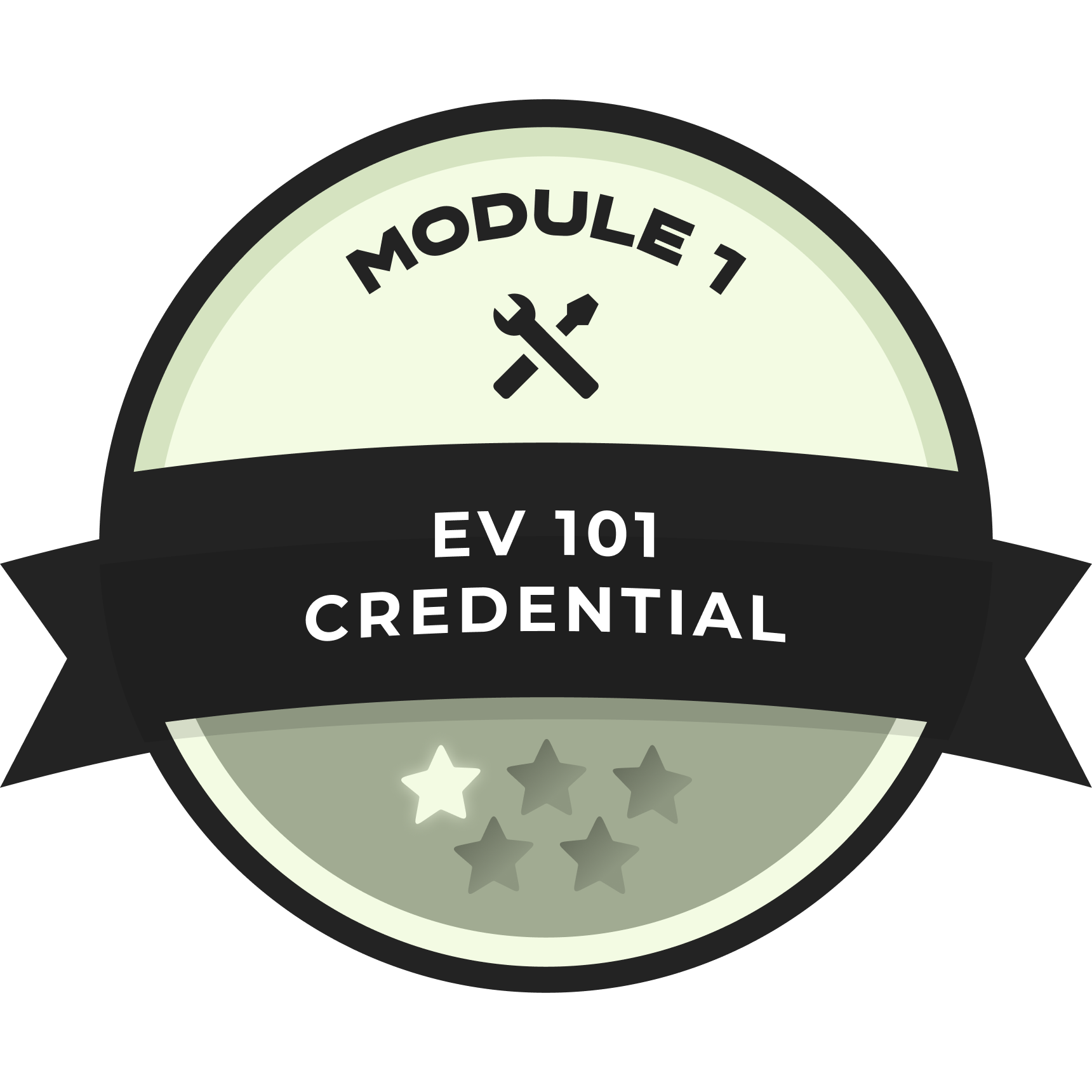
Course Overview
This course will explore the fundamentals of Electric Vehicles (EVs) that are required to start the process of wiring, mounting, and assembling an EV project. In totality, the course includes:
-
A brief history of EVs
-
An introduction to electrical circuits and components
-
EV systems vs. Internal Combustion Engine (ICE) Car systems
-
What you need to know about driving an EV
-
How to choose an EV system for your vehicle
-
The anatomy of an EV
Empty space, drag to resize
This course is designed as the first module of the EV Fundamentals Program. Buy the entire bundle now!
Empty space, drag to resize
EVSC Standards Covered in this Course
1.01 Define volts, amps, and watts and explain how each is measured
1.02 Define Ohm's law and explain how ohms effects wattage
1.03 Observe, describe, and predict the relationship between volts, ohms, and amperes in a variety of electrical circuits
1.04 Compare and contrast torque, power, and energy
1.05 Apply principles of Watt's Law to understand limitations of power in an EV
1.06 Apply principles of Ohm's Law to differentiate from conductors and insulators
1.07 Apply principles of Watt's Law to explain energy efficiency, mechanical power, and electrical power
1.08 Define an electrical circuit and explain the difference between an open and closed circuit
1.09 Define resistors, capacitors, inductors, transistors, diodes, contactors, and relays and explain what purpose they serve in an electrical circuit
1.10 Understand and explain the difference between a series and parallel circuit
1.11 Understand kWh and its relation to energy storage and electrical principles
1.S5.15 Apply principles of Watt's Law to calculate wattage of an electrical system
1.S8.18 Conduct a cost-benefit analysis of the economical, ecological, and societal impact of EV ownership
3.06 Explain the fundamental electromechanical functions of an EV motor
3.08 Know and compare the various EV motor technologies available on the market i.e. brushed DC, brushless DC, three phase AC, AC induction, axial flux, etc.
3.09 Understand the benefits and drawbacks on different motor technologies and generally understand their best use applications
4.03 Understand how battery kWh capacity affects range of a vehicle
4.04 Understand the difference between a battery cell, module, and pack
4.05 Know and compare the various types of battery chemistries and configurations available on the market i.e. cylindrical cell, prismatic cell, pouch cells and LFP, NMC, LiFePO4, etc.
5.01 Understand the role that range and charging have played in consumer adoption of EVs
5.03 Distinguish between an On Board Charger (OBC), an Electric Vehicle Charge Controller (EVCC), and Electric Vehicle Supply Equipment (EVSE)
1.02 Define Ohm's law and explain how ohms effects wattage
1.03 Observe, describe, and predict the relationship between volts, ohms, and amperes in a variety of electrical circuits
1.04 Compare and contrast torque, power, and energy
1.05 Apply principles of Watt's Law to understand limitations of power in an EV
1.06 Apply principles of Ohm's Law to differentiate from conductors and insulators
1.07 Apply principles of Watt's Law to explain energy efficiency, mechanical power, and electrical power
1.08 Define an electrical circuit and explain the difference between an open and closed circuit
1.09 Define resistors, capacitors, inductors, transistors, diodes, contactors, and relays and explain what purpose they serve in an electrical circuit
1.10 Understand and explain the difference between a series and parallel circuit
1.11 Understand kWh and its relation to energy storage and electrical principles
1.S5.15 Apply principles of Watt's Law to calculate wattage of an electrical system
1.S8.18 Conduct a cost-benefit analysis of the economical, ecological, and societal impact of EV ownership
3.06 Explain the fundamental electromechanical functions of an EV motor
3.08 Know and compare the various EV motor technologies available on the market i.e. brushed DC, brushless DC, three phase AC, AC induction, axial flux, etc.
3.09 Understand the benefits and drawbacks on different motor technologies and generally understand their best use applications
4.03 Understand how battery kWh capacity affects range of a vehicle
4.04 Understand the difference between a battery cell, module, and pack
4.05 Know and compare the various types of battery chemistries and configurations available on the market i.e. cylindrical cell, prismatic cell, pouch cells and LFP, NMC, LiFePO4, etc.
5.01 Understand the role that range and charging have played in consumer adoption of EVs
5.03 Distinguish between an On Board Charger (OBC), an Electric Vehicle Charge Controller (EVCC), and Electric Vehicle Supply Equipment (EVSE)
Empty space, drag to resize
Write your awesome label here.
